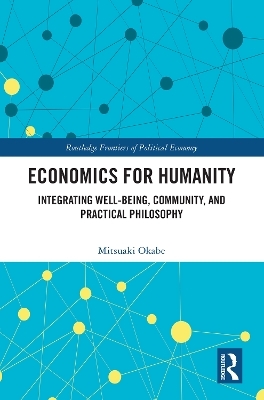
Economics for Humanity
Integrating Well-being, Community, and Practical Philosophy
Seiten
2024
Routledge (Verlag)
978-1-032-76447-4 (ISBN)
Routledge (Verlag)
978-1-032-76447-4 (ISBN)
By replacing it with a more realistic and multi-faceted human motive as supported by research in various academic disciplines, the book tries to provide a novel and more plausible picture of human society.
Economics is often referred to as “the queen of social sciences.” This is because mainstream economics has been established as an elegant academic discipline by assuming mankind simply to be homo economicus— an image of human beings showing interest in only material fulfilment and acting solely in his interest. This book challenges this basic perception of human beings.
By replacing it with a more realistic and multifaceted human motive as supported by research in various academic disciplines, the book tries to provide a novel and more plausible picture of human society. Specifically, the book takes in such human aspects as pursuing well-being, forming human networks, and the realisation of potential of ability. Thus, if we try to better understand human motives and the society, it becomes necessary to replace the conventional two-sector (market–government) social model with a more general and theoretically superior social model, the “three-sector model” consisting of market–government–non-profit sectors. This book demonstrates the validity of this new view by utilising basic principles of economic policy and social welfare analyses. Moreover, the book has introduced a newly developing practical philosophy in Japan over the last 50 years to achieve both individual well-being and better human society.
Economics is often referred to as “the queen of social sciences.” This is because mainstream economics has been established as an elegant academic discipline by assuming mankind simply to be homo economicus— an image of human beings showing interest in only material fulfilment and acting solely in his interest. This book challenges this basic perception of human beings.
By replacing it with a more realistic and multifaceted human motive as supported by research in various academic disciplines, the book tries to provide a novel and more plausible picture of human society. Specifically, the book takes in such human aspects as pursuing well-being, forming human networks, and the realisation of potential of ability. Thus, if we try to better understand human motives and the society, it becomes necessary to replace the conventional two-sector (market–government) social model with a more general and theoretically superior social model, the “three-sector model” consisting of market–government–non-profit sectors. This book demonstrates the validity of this new view by utilising basic principles of economic policy and social welfare analyses. Moreover, the book has introduced a newly developing practical philosophy in Japan over the last 50 years to achieve both individual well-being and better human society.
Mitsuaki Okabe is Professor Emeritus of Keio University, Japan.
Introduction and Overview I. Groundwork for Bettering Economics 1. Need for Economics to Fully Integrate Human Nature 2. Inheriting from Adam Smith: Ethics and Other Human Nature 3. Considering Humanity (1): Altruism 4. Considering Humanity (2): Social Networks II. Overview of Economics of Humanity 5. Towards Economics for Humanity 6. Three-Sector Model of the Economy 7. Theoretical Bases of the Three-sector Model III. Enriching Human Society: A Practical Philosophy 8. A Practical Philosophy for Well-being and Better Society ( I ) 9. A Practical Philosophy for Well-being and Better Society ( II )
| Erscheinungsdatum | 24.07.2024 |
|---|---|
| Reihe/Serie | Routledge Frontiers of Political Economy |
| Zusatzinfo | 20 Tables, black and white; 26 Line drawings, black and white; 26 Illustrations, black and white |
| Verlagsort | London |
| Sprache | englisch |
| Maße | 156 x 234 mm |
| Gewicht | 590 g |
| Themenwelt | Geschichte ► Teilgebiete der Geschichte ► Wirtschaftsgeschichte |
| Wirtschaft ► Allgemeines / Lexika | |
| Wirtschaft ► Volkswirtschaftslehre ► Wirtschaftspolitik | |
| ISBN-10 | 1-032-76447-3 / 1032764473 |
| ISBN-13 | 978-1-032-76447-4 / 9781032764474 |
| Zustand | Neuware |
| Informationen gemäß Produktsicherheitsverordnung (GPSR) | |
| Haben Sie eine Frage zum Produkt? |
Mehr entdecken
aus dem Bereich
aus dem Bereich
Macht und Herrschaft im Zarenreich
Buch | Hardcover (2024)
C.H.Beck (Verlag)
49,90 €
wie die USA und China um die technologische Vorherrschaft auf der …
Buch | Hardcover (2023)
Rowohlt (Verlag)
30,00 €


